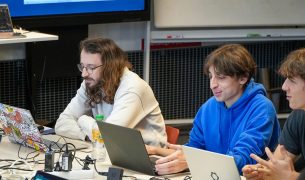In the evolving landscape of engineering education, interdisciplinary studies emerge as vital bridges, connecting the rigor of engineering principles with the vast expanse of other disciplines such as business, design, and environmental science. This fusion of knowledge enriches aspiring engineers’ educational journey and equips them with the versatile toolkit needed to tackle complex, real-world problems.
How does this approach foster innovation, enhance problem-solving skills, and prepare engineers for the multifaceted challenges of the modern world?
Expanding Horizons: The Need for a Broader Perspective
Engineering, at its core, is about solving problems. However, the nature of today’s issues is such that they seldom fall neatly within the bounds of a single discipline. Recognizing this, engineering education has begun emphasizing interdisciplinary studies, encouraging students to look beyond traditional boundaries.
Incorporating Business Awareness into Engineering
Integrating business concepts into engineering education equips future engineers with a keen understanding of market needs, financial acumen, and project management skills. This holistic view enables them to design solutions with technical precision viability and sustainability in mind, ensuring their innovations can successfully transition from blueprints to real-world applications.
Blending Design Thinking with Engineering Processes
Integrating design thinking into engineering curricula fosters creativity and user-centric problem-solving. By understanding and applying design principles, engineering students can create more intuitive, accessible, and aesthetically pleasing solutions, thereby enhancing the user experience and increasing the adoption of technological innovations.
Driving Innovation Through Diverse Thought
Interdisciplinary studies serve as a catalyst for innovation by bringing together diverse perspectives and skill sets. This convergence of knowledge from various fields sparks creativity and leads to groundbreaking solutions.
Leveraging Sustainable Engineering
As environmental concerns become increasingly central to engineering projects, incorporating sustainability into engineering education is critical. This interdisciplinary approach empowers engineers to create solutions that meet human needs and protect and preserve the environment, ensuring a sustainable future.
Enhancing Problem-Solving Skills with a Multidisciplinary Approach
The complexity of today’s challenges requires engineers to have robust problem-solving skills. Interdisciplinary studies enrich these skills by exposing students to various problem-solving methods, analytical tools, and perspectives, enabling them to approach problems innovatively and effectively.
Preparing for the Future: The Interdisciplinary Advantage
The demand for engineers who can navigate the complexities of the modern world is on the rise. Interdisciplinary studies prepare students for this reality, equipping them with the ability to integrate knowledge from different domains, collaborate across disciplines, and innovate solutions for a rapidly changing world.
Cultivating Adaptability and Lifelong Learning
The interdisciplinary approach in engineering education instills adaptability and a commitment to lifelong learning. Engaging with multiple disciplines teaches students to be flexible and open-minded, which is essential in an ever-evolving technological landscape.
Building a Foundation for Cross-Disciplinary Collaboration
Interdisciplinary studies lay the groundwork for effective collaboration among professionals from diverse fields. This ability to work cohesively across disciplines is crucial in addressing complex engineering challenges that require a holistic approach.
The role of interdisciplinary studies in engineering education cannot be overstated. Bridging the gap between engineering and other disciplines prepares students not just as engineers but as innovators and problem solvers capable of taking charge of creating a better future.
Through this comprehensive approach, engineering education is redefined, ensuring that graduates are not only technically proficient but also adept at navigating the multifaceted challenges of our world with creativity, sustainability, and a collaborative spirit at the forefront.





















